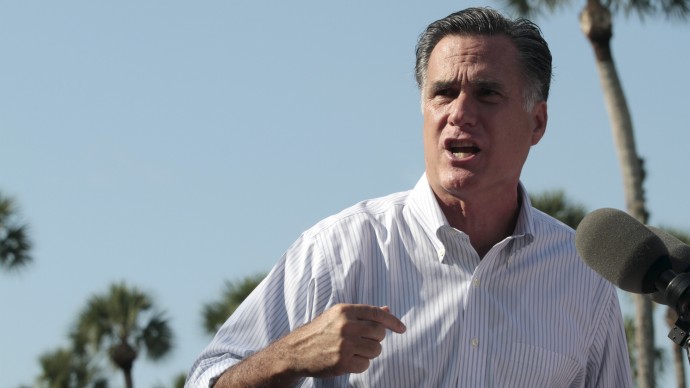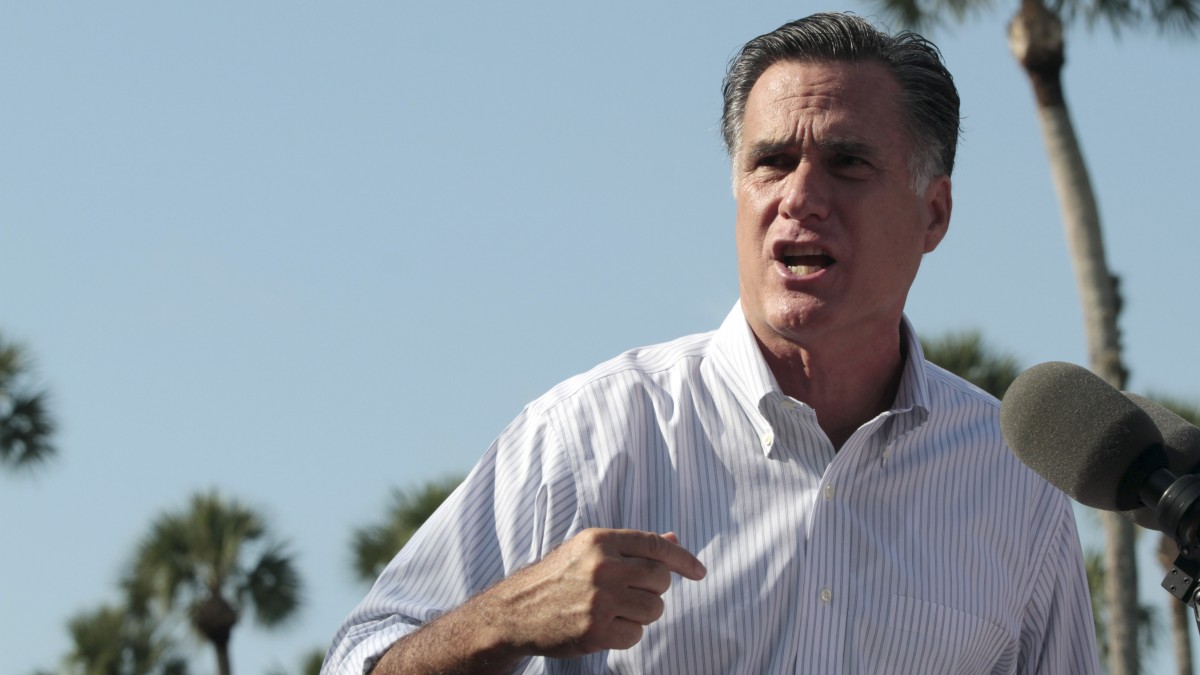
Political journalists naturally want to be where the action is. If a presidential race is unpredictable, so much the better. That’s why you hear so much about polls measuring the popular vote. Republican Mitt Romney has been very close or dead-even with President Barack Obama for months. Tension, drama, excitement! Who knows what will happen!
But if you look at another set of data, the story gets meh.
I’m talking about the Electoral College. Talking Points Memo probably has the best poll aggregation tool on the web, and for weeks, the president has had more than 300 electoral votes while Romney has yet to break 200 (you need 270 to win). That’s a very different kind of story for political reporters to tell, one that’s, well, a little boring.
No reporter wants to be assigned to a story that’s more or less a foregone conclusion. So don’t expect to hear more about this until November. But if present trends continue, the question might not be whether Barack Obama wins a second term but whether he claims a clear mandate by crushing Mitt Romney.
Obligatory caveat: There’s a long way to go in this election, and much can happen to launch Romney over 200 — a worsening debt crisis in Europe, his pick of fiscal conservative mantle-bearer Paul Ryan as vice president and, most importantly, anything that knocks the legs out from beneath our own gimpy economy (GDP growth has slowed to just 1.5 percent). The economy has always been Obama’s greatest weakness, which is why Romney continues to poll well with Americans reassured by his business background.
Even so, the Romney campaign knows time is running out.
Where Romney stands on the issues
While it’s true that few Americans are paying close attention to the election during the summer, summer is precisely when a campaign must find its footing before the hard slog after the convention and on to November, and almost no one, left and right, believes the Romney campaign has found its footing. Consider just the month of July.
His people couldn’t figure out whether to say the Supreme Court’s decision on Obamacare was a tax or a penalty, eliciting the howls of the editorial board of The Wall Street Journal. Romney was booed at the annual convention of the NAACP. Three times. His record as head of Bain Capital suddenly became a liability, where it once had been an asset, thanks to the hard-charging efforts of the Obama campaign and the fact that no one is quite sure when Romney quit running the Wall Street firm and if he was or wasn’t responsible for offshoring thousands of Americans jobs.
Then there’s Romney’s disastrous trip overseas. He insulted the British, wondering if they were prepared to host the 2012 Summer Olympics. He insulted the Palestinians, blaming them for their own poverty when in fact their poverty might have something to do with being occupied by a foreign (Israeli) power. In every country, in fact, his campaign logged a humdinger of a gaffe (in Poland, his spokesman told the press to “kiss my ass”), and all this pretty much undermines Romney’s argument that Obama embarrasses America abroad. That’s a hard position to maintain when the first thing you do is embarrass yourself in front of America’s closest ally — over the Olympics of all things.
Best of all: Romney won’t release more than a year of tax returns even though his father, George, set the standard when he ran for president in the late 1960s. This is why conservative pundits like Charles Krauthammer are giving advice in a passel of op-eds. They all more or less say: Please. Dear. God! Don’t let Mitt blow this!
Romney helping Obama with reelection
Romney knows the polls suggest he’s in trouble, which is probably why he pushed back hard against a new poll by none other than Fox News on Friday showing he’s trailing Obama by nine points, the widest margin yet. This was in the same week that polls by Reuters and CNN each showed him trailing by seven points. On Friday, TPM had Obama at 317 electoral votes; Romney at 191.
You could say Romney has made the president’s job of getting reelected a bit easier. Romney has been stunningly incapable of defining who he is — he won’t talk about his time as governor of Massachusetts (because of, you know, Romneycare), his religion (Mormonism), his personal history (Mr. Richie Rich) or his family (also Mormons, who are also rich, plus he pales in comparison to his dad, a decent human being). All he can do is talk about this sucky economy and that Obama is to blame for its continued sucking.
This inflexibility has been a blessing for the president for two reasons. One, it allowed him to define Romney. Polls suggest that Obama’s efforts to cast Romney in the role of Wall Street fat cat hoping to rob the middle class to give to the rich is working, especially in crucial swing states like Ohio. Two, it allowed the president to change the subject. Just when Romney wants to talk about the economy, Obama wants to talk about fairness.
I suppose there’s a third reason that Romney is making reelection easier. The longer he goes without releasing more tax returns, the more time he gives Obama to suggest, rightly or wrongly, that he has something to hide. No credible voice has said Romney has done anything illegal; we can take him at his word that he had paid every dime he was obliged to pay. But Obama isn’t interested in anything that’s against the law; what he’s interested in is what, for guys like Romney, is perfectly legal.
Obama and OWS
It should be remembered that around this time last year, Obama was mired in a debate with top Republicans over deficits, a debate that led to a downgrading of U.S. debt and to the stymieing of the economic recovery. But then something miraculous happened — outraged youth from all over stormed Wall Street to hold bankers responsible for the stalled state of the economy. The 2008 crisis wasn’t an accident, they said. It was the result of favorable politics for the rich over the course of 30 years. This is not a fight over “entitlements,” as conservatives say. This is a fight by the 99 percent against the real culprits.
The Occupy movement opened a space in political discourse for Obama to talk about fairness, something that every working American feels is missing right now. While everyone else was suffering, the bankers got bailouts and bonuses. This is not an issue, as the tea party claimed, of government getting involved when it shouldn’t. This is about fairness, and no amount of worry over deficits is going to trump the politics of justice.
Romney is playing a role already written by the Occupy movement — he is the 1 percent against the other 99. So Obama can point to him as someone to blame for the economy, not someone who can fix it. But more importantly, the Occupy movement made it safe to tell the truth about guys like Mitt Romney, who is among the top 10 percent of income earners, the same people who own 74 percent of all wealth in the United States, a staggering fact.
This, more than anything, may be why Romney won’t release more of his tax returns; they’d serve to enrich a story already being told. And without Occupy, the president might be stuck using the soft middling rhetoric of Clinton’s New Democrats. Instead of “fairness,” he’d be talking about “opportunity,” which would be just the thing Romney would prefer.
From the beginning, Romney has wanted to frame this election as a referendum on the president. Thanks to Occupy, Obama has escaped that trap, framing the election instead as a choice between ideologies — one that serves the 1 percent and one that serves the rest.


